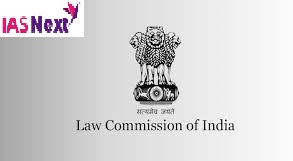CURRENT AFFAIRS
Get the most updated and recent current affair content on Padhaikaro.com
Law Commission of India
- IAS NEXT, Lucknow
- 10, Dec 2021

Reference News:
The Government has informed the Supreme Court that appointment of the Chairperson and Members of the 22nd Law Commission of India is under consideration.
What’s the issue?
The 22nd Law Commission was constituted by the Government on February 21, 2020. However, no progress has been made in the appointments till date and the short affidavit filed by the Law Ministry in the court does not explain the reasons for the day.
The ‘doctrine of separation of power’:
During the hearing, the Government invoked the ‘doctrine of separation of power’, which says that one arm of governance should not encroach into that of another.
About the law commission of India:
It is an executive body established by an order of the Government of India.
- Originally formed in 1955, the commission is reconstituted every three years and so far, 277 reports have been submitted to the government.
- The last Law Commission, under Justice B.S. Chauhan (retd.), had submitted reports and working papers on key issues such as simultaneous elections to the Lok Sabha and the Assemblies and a uniform civil code.
Composition:
- Apart from having a full-time chairperson, the commission will have four full-time members, including a member-secretary.
- Law and Legislative Secretaries in the Law Ministry will be the ex-officio members of the commission.
- It will also have not more than five part-time members.
- A retired Supreme Court judge or Chief Justice of a High Court will head the Commission.
Roles and functions:
- The Law Commission shall, on a reference made to it by the Central Government or suo motu, undertake research in law and review of existing laws in India for making reforms and enacting new legislation.
- It shall also undertake studies and research for bringing reforms in the justice delivery systems for elimination of delay in procedures, speedy disposal of cases, reduction in cost of litigation, etc.
Reforms needed:
The Law Commission should be brought under a statute with definite terms on appointments, its functions and powers spelt out.
What is the doctrine of Separation of Power?
- It refers to the model of governance where the executive, legislative and judicial powers are not concentrated in one body but instead divided into different branches.
- It is not explicitly mentioned in the constitution.
Articles in the Constitution facilitating Separation of Powers are as follows:
- Article 50: State shall take steps to separate the judiciary from the executive. This is for the purpose of ensuring the independence of the judiciary.
- Article 122 and 212: Validity of proceedings in Parliament and the Legislatures cannot be called into question in any Court. Also, Legislators enjoy certain privileges with regard to speech and anything said in the Parliament cannot be used against them.
- Judicial conduct of a Judge of the Supreme Court and the High Court cannot be discussed in the Parliament and the State Legislature, according to Article 121 and 211 of the Constitution.
- Articles 53 and 154 respectively, provide that the executive power of the Union and the State shall be vested with the President and the Governor and they enjoy immunity from civil and criminal liability.
- Article 361: The President or the Governor shall not be answerable to any court for the exercise and performance of the powers and duties of his office.